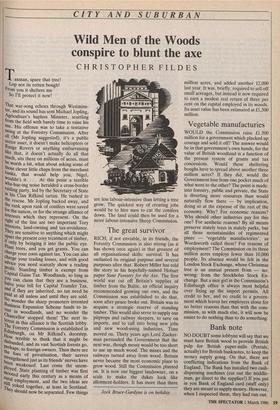The great survivor
RICH, if not enviable, in its friends, the Forestry Commission is also strong (as it has shown once again) in that greatest of all organisational skills: survival. It has outlasted its original purpose and several purposes after that. Robert Miller has told the story in his hopefully-named Hobart paper State Forestry for the Axe. The first world war cut off Britain's supplies of timber from the Baltic, an official inquiry recommended growing our own, and the Commission was established to do that, soon after peace broke out. Britain was to acquire a strategic reserve of standing timber. This would also serve to supply our pitprops and railway sleepers, to save on imports, and to call into being new jobs and new wood-using industries. Time moved on. Thirty years ago Lord Zucker- man persuaded the Government that the next war, though messy would be too short to use up much wood. The mines and the railways turned away from wood. Britain never became the most economic place to grow wood. Still the Commission planted on. It is now our biggest landowner, on a scale to make the dukes look like allotment-holders. It has more than three Jock Bruce-Gardyne is on holiday million acres, and added another 12,000 last year. It was, briefly, required to sell off small acreages, but instead is now required to earn a modest real return of three per cent on the capital employed in its woods. Its asset value has been estimated at £1,500 million.














































 Previous page
Previous page